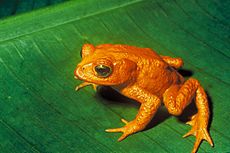Data deficient facts for kids
Quick facts for kids Conservation status
|
|
|---|---|
 |
|
| Extinct | |
|
|
| Threatened | |
|
|
| Lower Risk | |
|
|
|
Other categories |
|
|
|
|
Related topics
|
|
 Comparison of Red list classes above and NatureServe status below  |
|
A data deficient (DD) species is an animal or plant that scientists don't have enough information about. The International Union for Conservation of Nature (IUCN) uses this status when they can't figure out if a species is safe, threatened, or in danger of disappearing.
This doesn't always mean no one has studied the species at all. It usually means there isn't enough data on how many of them exist or exactly where they live. Sometimes, it also means scientists aren't sure how to properly group or name the organism.
Contents
What Does "Data Deficient" Mean?
When a species is labeled "data deficient," it means there isn't enough scientific information to decide its true conservation status. The IUCN needs to know things like:
- How many individuals of the species are left?
- Where do they live?
- Is their population growing, shrinking, or staying the same?
Without answers to these questions, it's hard to tell if a species needs help or not.
Why Are Some Animals "Data Deficient"?
There are several reasons why a species might be "data deficient."
- Not Enough Surveys: Scientists might not have had enough time or resources to study the species properly in its natural home.
- Hard to Find: Some animals or plants live in remote places, are very shy, or are active only at night, making them difficult to observe.
- Uncertain Classification: Sometimes, scientists aren't sure if a group of animals is one species or actually two or more different species. This makes it hard to count them correctly.
The Orca Example
A good example of a "data deficient" species is the orca, also known as the killer whale. Even though orcas are well-known, the IUCN lists them as "data deficient." This is because scientists believe there might be several different types of orcas that are actually separate species. If they are different species, some types might be in danger, while others are not. More research is needed to understand each type of orca better.
Why Is This Status Important?
The "data deficient" status is a warning sign. The IUCN suggests that scientists should be careful not to label a species as "data deficient" if it might actually be in serious trouble. If an animal is only found in a small area, or if it hasn't been seen in a long time, it might be endangered even without complete information. This idea is called the "precautionary principle"—meaning it's better to be safe than sorry when it comes to protecting nature. It encourages more research to find out the true status of these species.
See also
 In Spanish: Especie con datos insuficientes para niños
In Spanish: Especie con datos insuficientes para niños
- IUCN Red List data deficient species
- List of data deficient amphibians
- List of data deficient fishes
- List of data deficient mammals
- List of data deficient plants
 | Delilah Pierce |
 | Gordon Parks |
 | Augusta Savage |
 | Charles Ethan Porter |

